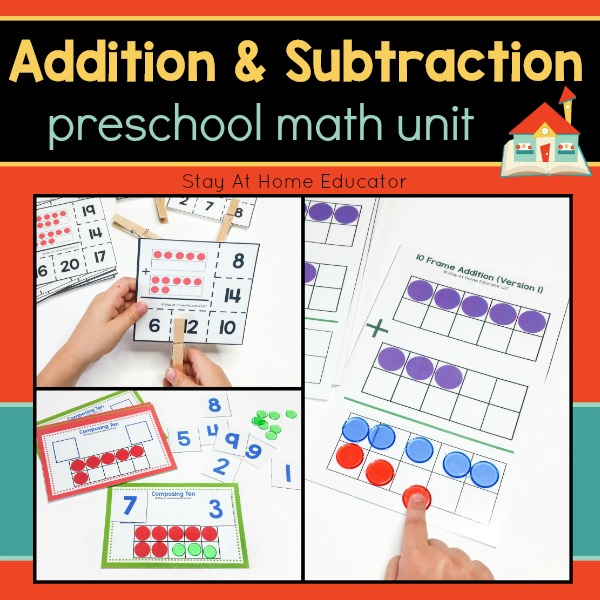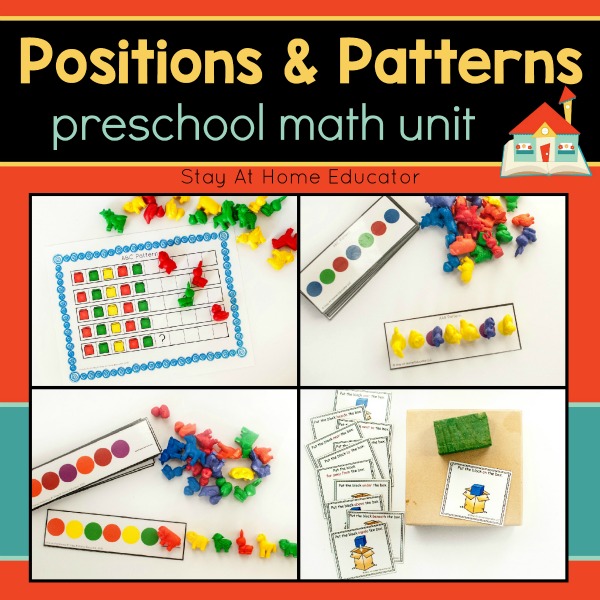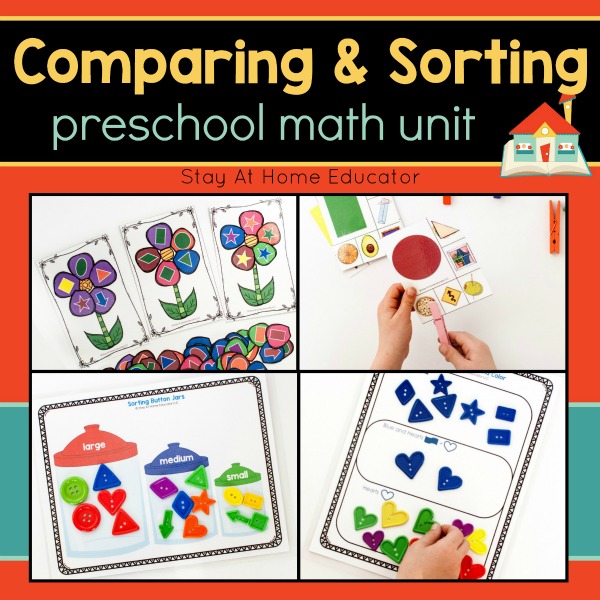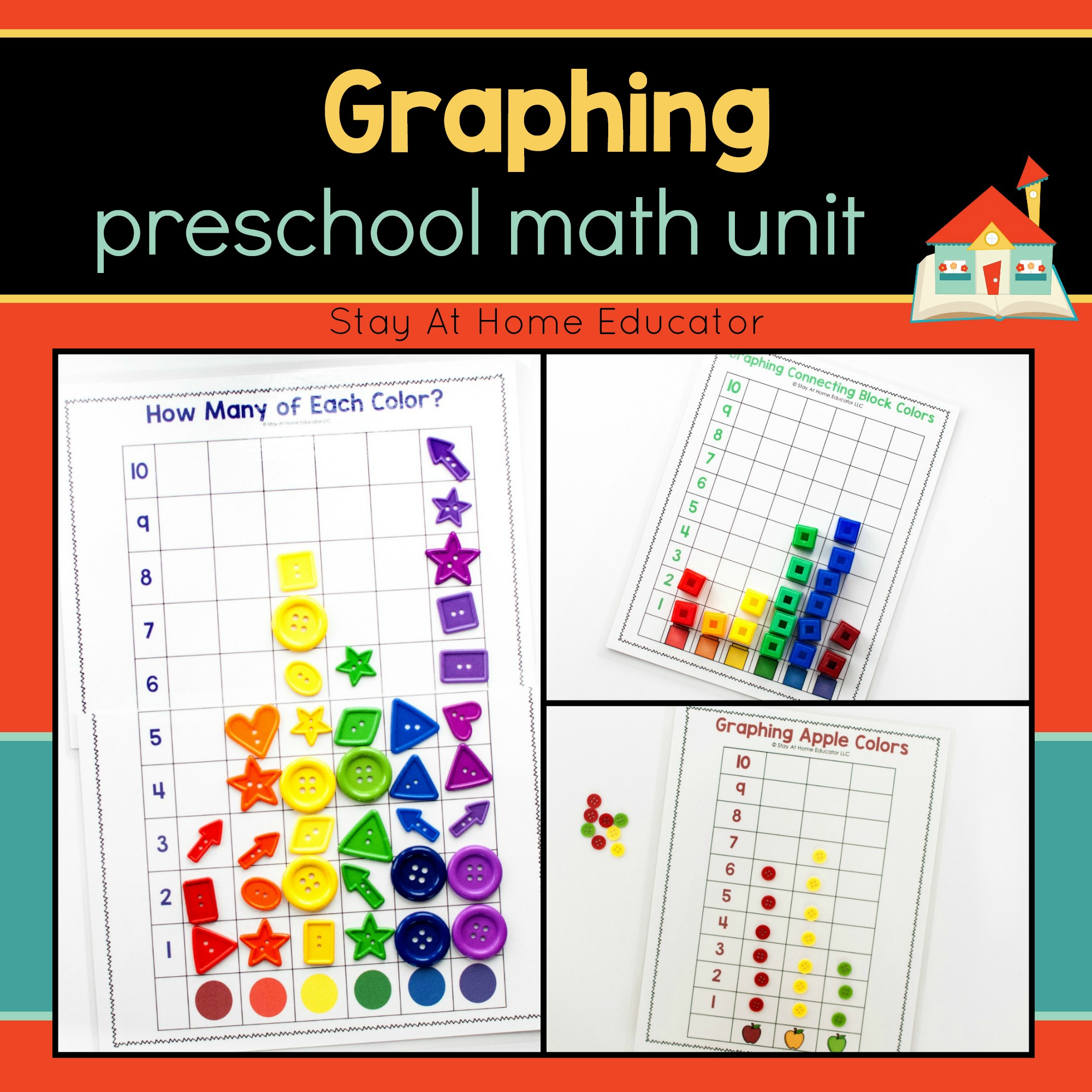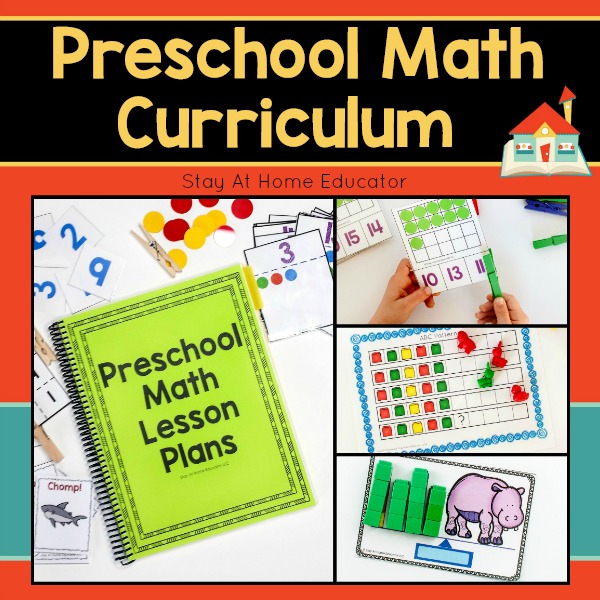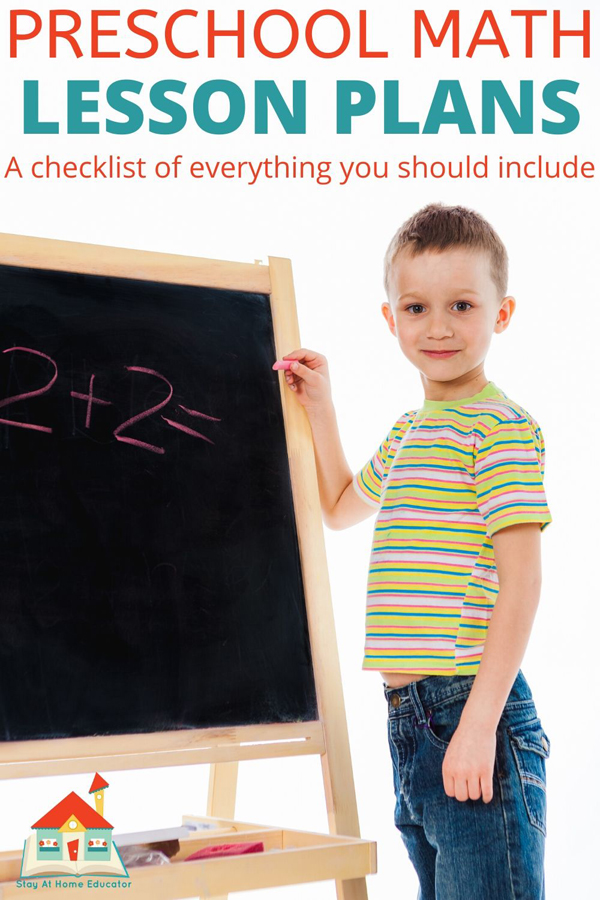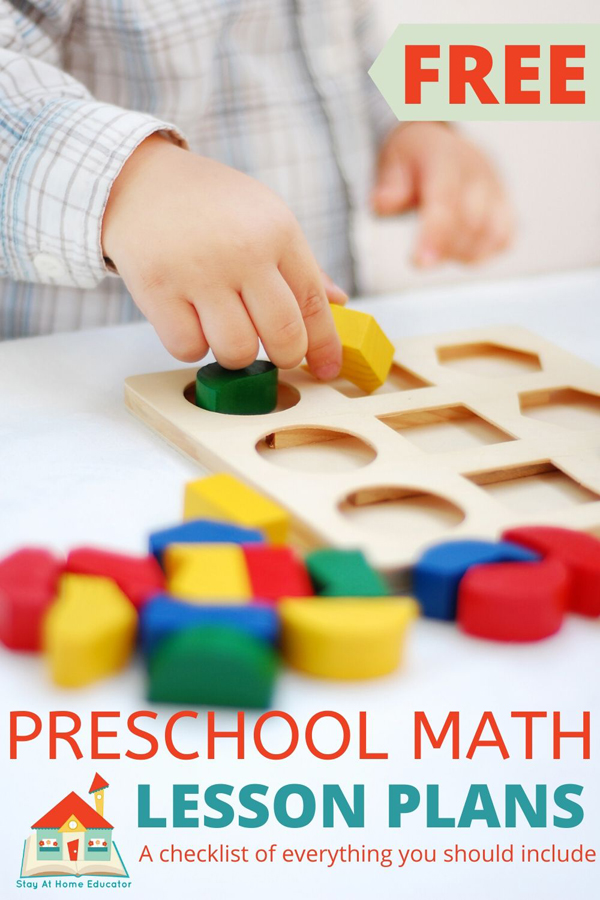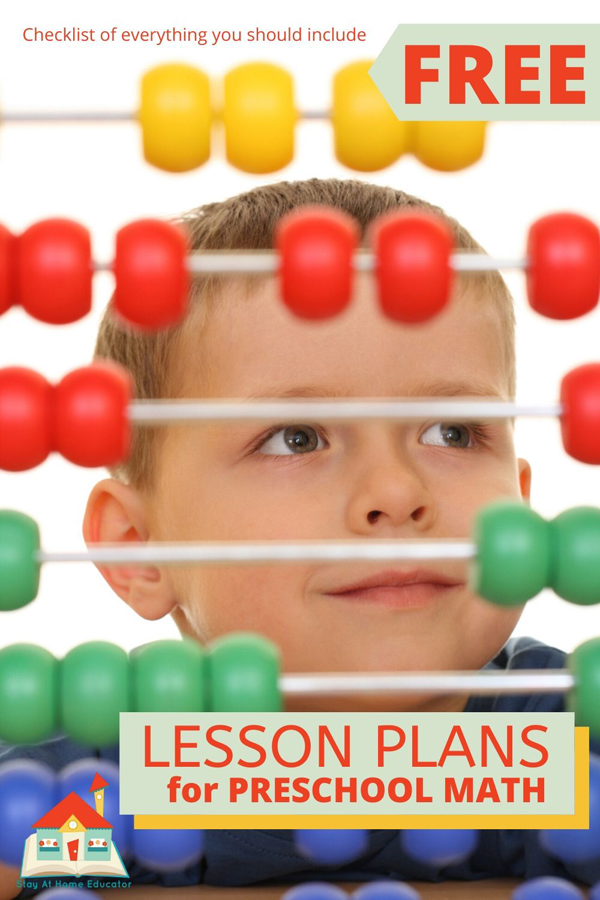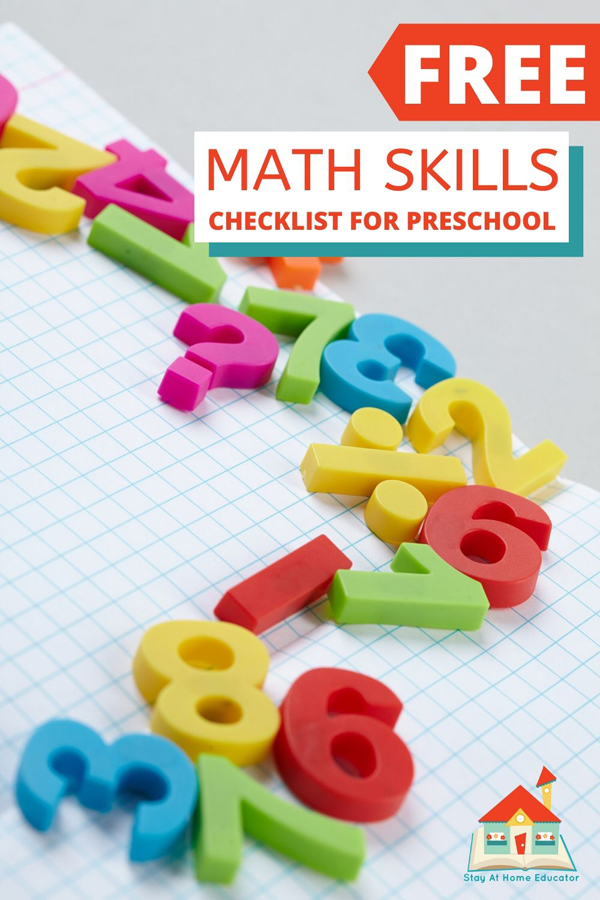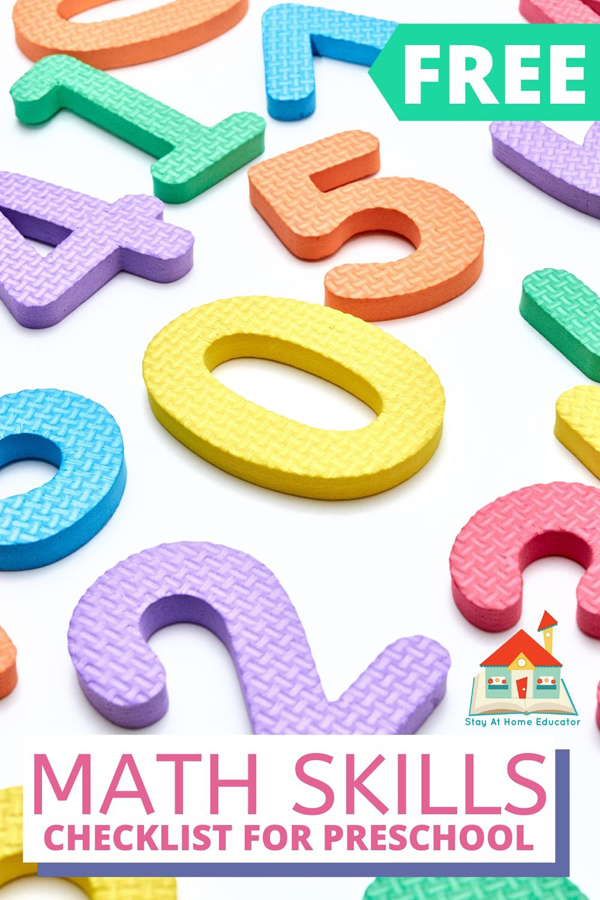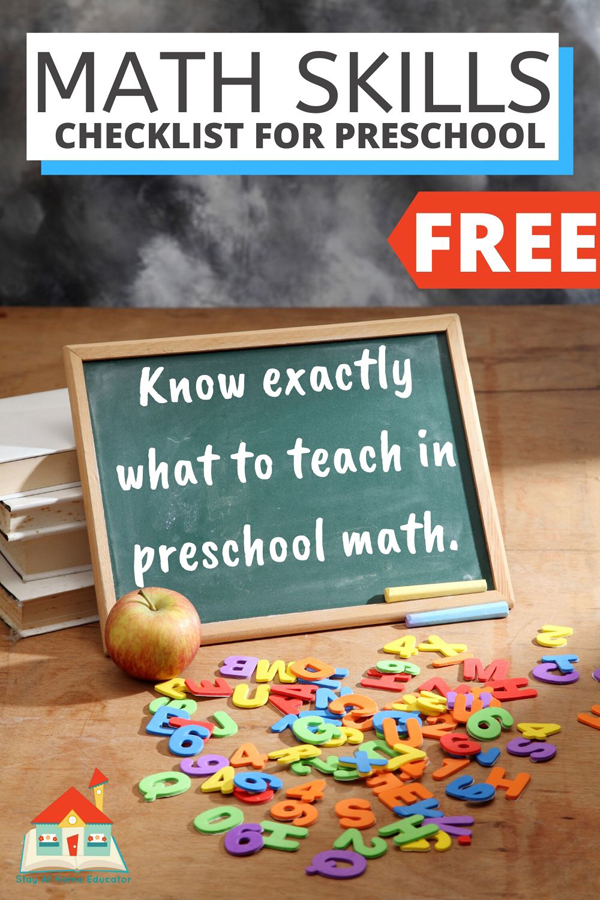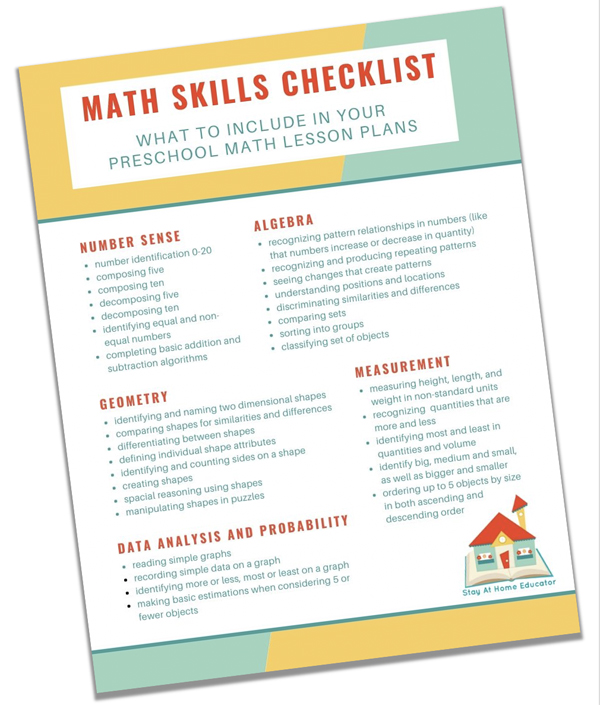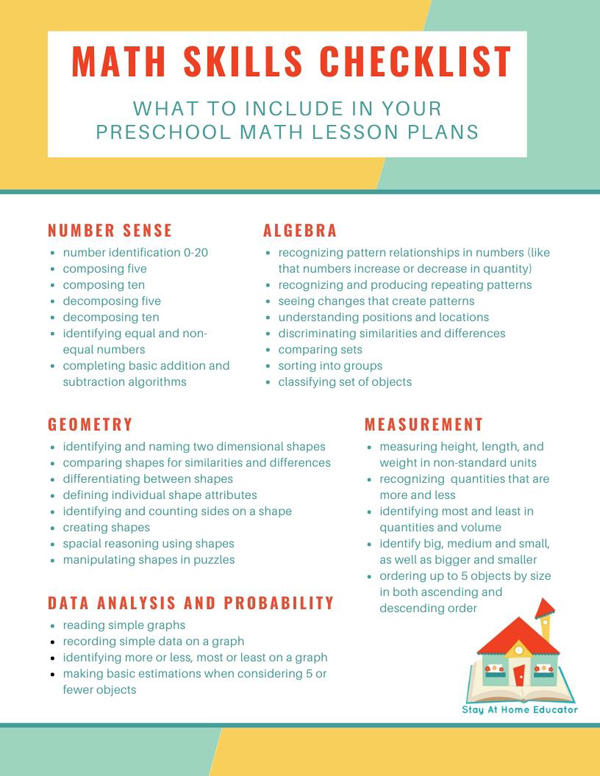Teaching math to preschoolers is more than just number identification and counting. Find out everything you need to know about teaching preschool math including what to include in your preschool math lesson plans to make sure they are playful and complete.
***This post contains a free printable math skills checklist, so you can make sure you include all the important skills in your preschool math lesson plans.***
5 Things All Preschool Math Lesson Plans Should Include
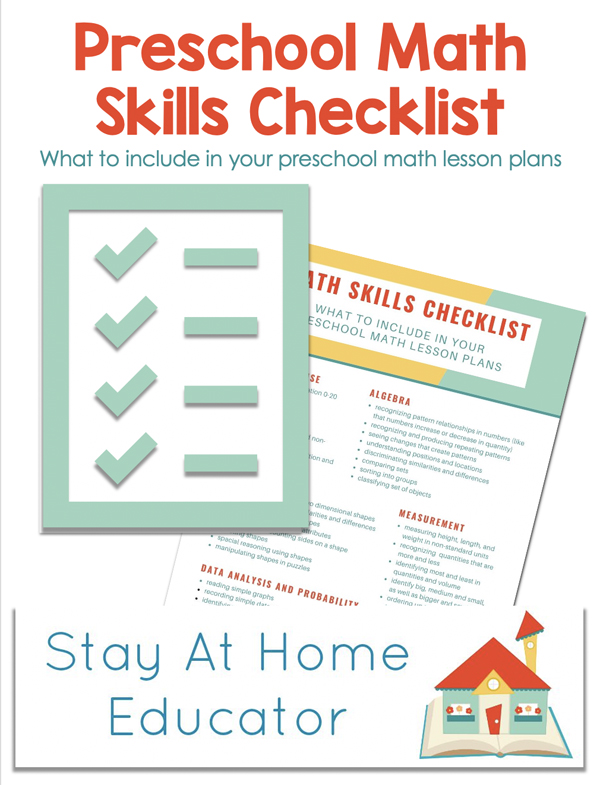
When I first started teaching preschool, my lesson plans for math were a little haphazard.
You see, Pinterest was brand new back then, and I was easily sucked into all the cute preschool activities that filled my feed. In fact, I remember signing up and taking their little quiz of interests and within minutes Pinterest generated a feed full of (specifically) counting activities for preschoolers.
Carefully planned and staged, almost certainly thematic in nature, I scrolled through hundreds of thousands of beautiful images that seemed to say, “Your preschoolers will learn everything they need with the upper cute math craft.”
And I liked that. I mean, everyone is drawn to pretty pictures, right? And as a content creator myself, I try to include plenty of pretty, but realistic pictures in my posts.
But the problem back then was that I was just pulling activities that looked fun! Don’t get me wrong, fun activities are important in preschool, especially fun math activities for preschool, but what if all the fun activities happen to be in the same domain?
Like counting?
Or number recognition?
What if all the math activities we teach in preschool end up being related to number sense and we forget to (or don’t realize we should) also include things like graphing activities or measurement activities in our preschool math lesson plans?
This may or may not surprise you, but there are actually five domains in math that should be included in every set of preschool or pre-k math lesson plans.
Number Sense Activities
Simply put, number sense means to have a deep and thorough understanding of numbers and how they work in relationship to one another. Number sense skills include:
- knowledge of specific quantities
- naming numbers
- counting with one to one correspondence
- addition
- subtraction
When choosing a preschool math curriculum, or when creating your own math lesson plans for preschoolers, it’s important to include a wealth of number sense activities.
For example, in my counting lesson plans for preschoolers, I include several math activities that range in focus from number identification and one to one correspondence to comparing quantities and composing ten. My preschool counting lesson plans give my preschoolers a very strong foundation in number sense skills.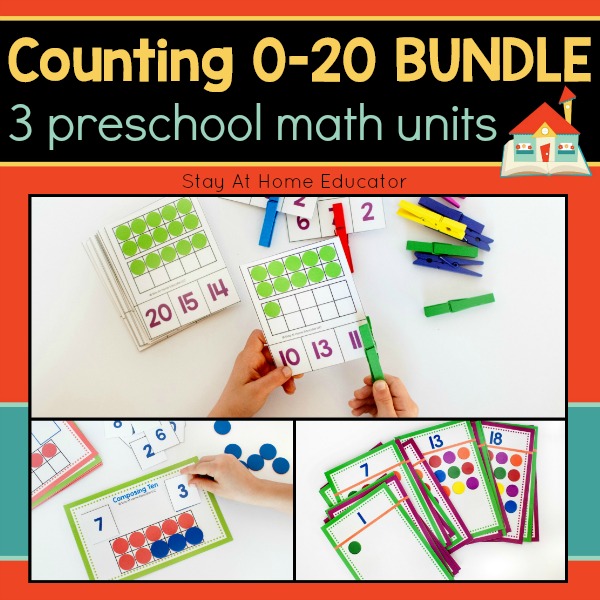
0-20 Counting Lesson Plans for Preschoolers
But the math activities for your preschool math lesson plans aren’t complete if they limited number sense activities related to just counting and number identification. You also have to include addition and subtraction skills in preschool. There’s no need to worry about your preschooler being able to form algorithms, but it is very appropriate for preschoolers to learn that adding makes more and subtracting makes less.
I cover those skills in a completely different unit: my addition and subtraction lesson plans for preschoolers.
Addition and Subtraction Lesson Plans for Preschoolers
When planning addition and subtraction activities for your preschool lesson plans for math, you should include:
- composing five
- composing ten
- decomposing five
- decomposing ten
- identifying equal and non-equal numbers
- completing basic addition and subtraction algorithms
***This post contains a free printable math skills checklist, so you can make sure you include all the important skills in your preschool math lesson plans.***
You might find these posts informative.
Foundational Math Topic: Number Sense
Number Sense Activities for Little Learners
Algebraic Activities for Preschoolers
Yes, preschoolers can learn algebra. In fact, some might argue that preschoolers learn algebraic skills before some number sense skills. In preschool, algebraic skills are related to recognizing spatial relationships and patterns. They include:
- recognizing pattern relationships in numbers (like that numbers increase or decrease in quantity)
- recognizing and producing repeating patterns
- seeing changes that create patterns
- understanding positions and locations
- discriminating similarities and differences
- sorting into groups
Any set of early childhood math lesson plans should include algebraic concepts. In their most simple form, they are sorting and patterning skills, as well as positional skills (like understanding under, over, into, besides, around, etc).
For example, in my positions and patterns lesson plans for preschoolers, I include over 44 math activities that focus on learning position names and various skills patterning. For many preschoolers, these skills come fairly naturally.
Positions and Patterning Preschool Lesson Plans
These lesson plans are well developed because not only will your preschoolers learn how to identify and generate positional words, but they will also develop strong patterning skills. This unit offers a range of patterning activities, making sure concepts are being reinforced in systematic and multiple ways. For example, this unit includes patterning concepts like:
- identifying a pattern (or mistakes in a pattern)
- reading a pattern
- copying a pattern
- continuing a pattern
- continuing a pattern when the properties are not explicitly stated
- developing patterns
But patterning activities are not the only activities that should be included in math under the algebra domain. It also includes comparing and sorting activities.
***Don’t forget to grab your free preschool math skills checklist at the end of this post.***
Comparing and sorting activities help preschoolers see relationships among sets of objects and those skills parallel those of patterning. Comparing and sorting activities should include:
- identify matching sets
- differentiating among groups
- finding similarities among groups that are otherwise different
- sorting by multiple attributes
Comparing and Sorting Preschool Lesson Plans
Like all my other lesson plans for math, this unit includes over 36 hands-on math activities for preschoolers, as well as eight printable math centers. It even include picture book recommendations to support sorting and comparing skills.
You Might Also Find These Posts Informative
The Early Algebra of Little Kids
Teaching Algebraic Thinking to Young Children
Preschoolers Can Do Algebra, John Hopkins Study Shows
Geometry Activities for Preschoolers
Geometry skills in a preschool are pretty obvious. Geometry is the domain in mathematics that concerns shapes and lines and their relationship in space. In a preschool setting, geometry skills include:
- identifying shapes
- comparing shapes
- differentiating between shapes
- creating shapes
- spacial reasoning using shapes
Most preschool teachers and parents are already teaching their preschoolers about shapes in their preschool math lesson plans. Are you doing enough? Are you hitting all five bullet points above in your preschool math activities for lesson plans?
My shapes preschool math unit includes everything you need to teach beginning geometry and shapes in preschool math.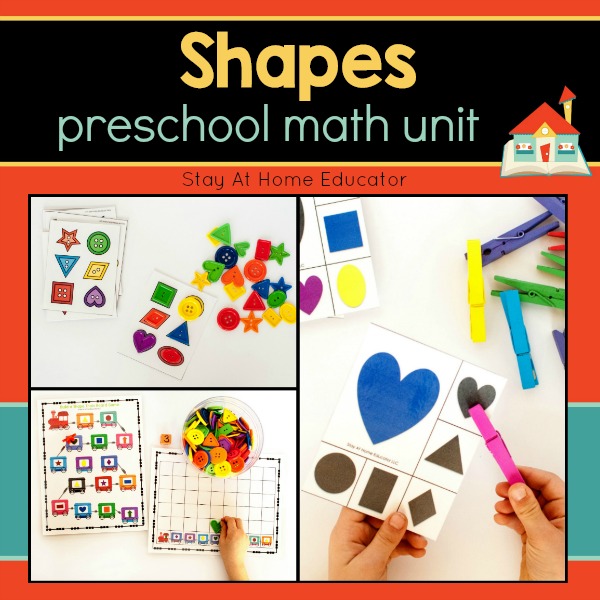
Shapes Preschool Lesson Plans
These preschool lesson plans for shapes give you the lesson plans and the centers, as well as smaller daily math activities to keep your students learning. Not only will your preschoolers learn how to identify and compare basic shapes, but they will also develop spatial awareness skills. This unit offers a range of geometry activities, making sure concepts are being reinforced in systematic and multiple ways.
Just to give you an idea, these are the center included in the lesson plans:
- 1-1 Shape Concentration
- 1-2 Which One is the Same?
- 1-3 Build a Shape Train Board Game
- 1-4 Shape Puzzles
- 1-5 Shape “Tracing”
- 1-6 Shape Layering Visual Discrimination Game
- 1-7 Attribute Button Matching Cards
- 1-8 Everyday Shapes Sorting
***This post contains a free printable math skills checklist, so you can make sure you include all the important skills in your preschool math lesson plans.***
You might also appreciate these informative posts.
Discovering Shapes and Space in Preschool
Preschoolers’ Understanding of a Geometric Shape
Learning and Teaching Geometry in Early Childhood
Measurement Activities for Preschoolers
In preschool, measurement activities concern the ability to recognize and define the size or amount of something. These are typically established using non-standard units of measure.
Breaking down the measurement theme, preschool math lesson plans in shapes should include:
- measuring height, length, and weight in non-standard units
- recognizing quantities that are more and less
- identifying most and least in quantities and volume
- identify big, medium and small, as well as bigger and smaller
- ordering up to 5 objects by size in both ascending and descending order
Preschoolers should experience ample practice in measurement so they can make connections between bigger and growing objects and number line math. sometimes it is difficult to gather measurement activities for preschool, which is one reason why I wrote my measurement preschool math unit. It lays out what skills preschoolers should learn as well as what order to teach them, all while offering fun, hands-on activities.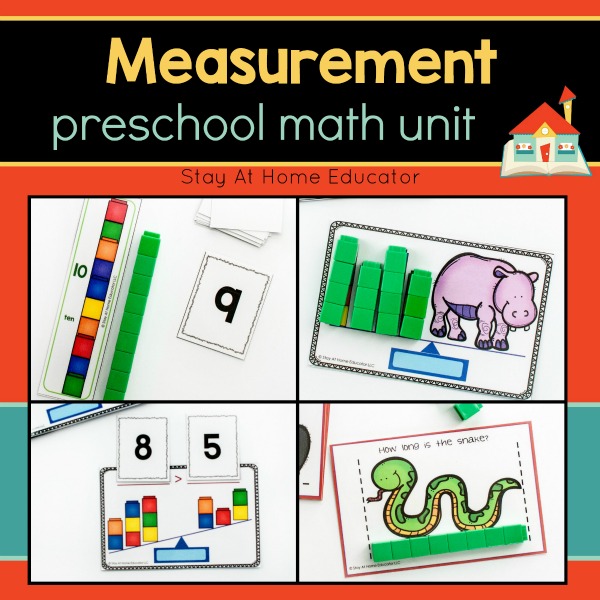
Measurement Preschool Lesson Plans
Measurement activities don’t have to include specialty tools and toys, either. You can create measurement lesson plans for your preschoolers that use inexpensive printables and common classroom and household items.
***Don’t forget to grab your free preschool math skills checklist at the end of this post.***
You might also find these posts informative.
Measurement in the Preschool Classroom
How to Teach Kids Units of Measurement
Preschool Children’s’ Understanding of Length and Measurement in Japan
Data Analysis and Probability in Preschool
I know, you’re probably thinking, “What?! In preschool?!” But preschoolers are more than capable of learning about data analysis and probability. Think graphs and estimation. In preschool, data analysis and probability skills include:
- reading simple graphs
- filling in simple data on a graph
- identifying more or less, most or least on a graph
- making basic estimations when considering 5 or fewer objects
In my graphing lesson plans for preschoolers, preschoolers are introduced to graphing concepts via building on their sorting skills. This is met with short, hands-on, teacher-directed activities that are reinforced with included printable math centers that can be done individually or with a partner or small group.
Graphing Preschool Lesson Plans
In my graphing preschool math unit, preschoolers learn to read a graph, as well as how to create one of their own. From graphing colors to graphing sets of “random” items, this unit is creative and well-thought-out. This unit offers a range of graphing activities, making sure concepts are being reinforced in systematic and multiple ways.
These posts talk more about data analysis and probability in preschool.
Can We Teach Probability to Young Children…
Understanding Concepts of Probability in Pre-Schoolers…
Get A Free Preschool Math Lesson Plans Skills Checklist
Are you feeling overwhelmed? No need to be. I’ve got you covered. You can use this list as a guideline on how to teach math to preschoolers and you can certainly write own preschool math lesson plans.
Grab your free math skills checklist by clicking the image below and the pdf will be sent to your email.
Get Done for You Math Lesson Plans for Preschoolers
This Preschool Math Curriculum is designed to teach your preschooler all five disciplines of math without the boring worksheets! Children enjoy a variety of daily math activities in addition to 72 individual, hands-on and playful math centers!
>>> Buy the Entire Preschool Math Curriculum Here <<<
This product is a bundle of all nine math units and includes EVERYTHING YOU NEED to teach preschool math for an entire year! It is systematically designed, allowing you to teach your child or preschool students math in an organized manner. No need to wonder how to approach preschool math, these lesson plans lay it out for you, but are flexible enough to be tweaked for the needs of your students. In fact, many of the activities included offer variations based on skill level.
The preschool math curriculum includes 36 weeks of spiraling lesson plans in all five disciplines of math (number sense, algebra, geometry, measurement, and data analysis), with an emphasis on developing number sense skills and counting and number identification up to 20.
Preschool Math Curriculum

I’m Sarah, an educator turned stay-at-home-mama of five! I’m the owner and creator of Stay At Home Educator, a website about intentional teaching and purposeful learning in the early childhood years. I’ve taught a range of levels, from preschool to college and a little bit of everything in between. Right now my focus is teaching my children and running a preschool from my home. Credentials include: Bachelors in Art, Masters in Curriculum and Instruction.
